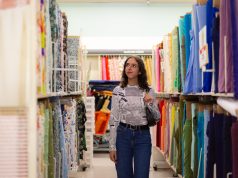Several Miami-Dade County groups are working to increase voter participation in one key 2020 demographic – college students.
Members from partisan and nonpartisan political groups joined together for a discussion called “Political Power: Becoming Politically Active” at Books & Books in Coral Gables on Saturday. The event was organized by Strength in Numbers/Power in Connection, an organization that presents workshops related to women’s issues, but is gender inclusive.
Eight groups were represented: the Democratic Women’s Club of Miami-Dade, Miami-Dade Young Democrats, Old Cutler Republican Women’s Club, University of Miami College Republicans, Equality Florida, Women’s March Florida, League of Women Voters of Miami-Dade County and Rise Up Florida!
League of Women Voters President Marisol Zenteno said her group discovered a lot of registered voters are not exercising that right. She said the causes range from voter apathy to a belief that one vote does not make a difference.
“Right now, we’re focusing on college campuses,” she said. “We want to make the elections real to the individual, especially to young people, because this is their future.”
When speaking to young voters, she said she talks about issues that they can identify with, such as affordable housing or climate change. Since the mayor and county commissioners make many decisions related to that, Zenteno said she focuses on those races.
During election season, the League of Women Voters has a guide — VOTE411.org — that allows voters to check what is on their individual ballots and where candidates stand on which issues. The information is obtained through four or five questions that the organization asks candidates. According to Zenteno, over 100,000 people in Miami-Dade County used the service in 2018.
Micaela Stoner, president of the University of Miami College Republicans, said the club is focused on ensuring that students get involved in politics because being informed and active is important.
“People are upset with situations, upset with how the government’s working, but then they don’t go out and do anything and that’s what we’re trying to end,” Stoner said.
Members volunteer for local campaigns, participate in door-to-door canvassing and debate the university’s Democratic club. In addition, she said members are provided with internship opportunities – including a program to work at the White House.
The club accepts members with opposing views despite being partisan.
“We have good attendance at our meetings and in our club because we create an environment that’s very, ‘We don’t care what you think, just come and talk with us.’ We definitely touch on both sides. We’re just telling people the straight facts and we think that the truth matters,” Stoner said.
Diaundrea Sherill, president of the Miami-Dade Young Democrats, said her organization is trying to help voters to be aware of what’s on the ballot aside from the candidates. The group also hosts events for individuals to meet elected officials and ask questions.
“We want to make sure we’re doing the necessary research to find out information so that we can actively provide it to folks who need to know, such as voter registration deadlines, what precincts they’re in, where they can go to vote and if they need to update their voter registration card or address,” Sherill said.
The group visits colleges and high schools throughout the county. They engage with students as young as 16 in response, she said, to Democratic presidential candidate Andrew Yang’s proposal to lower the voting age.
“It’s not just about Democrat or Republican, it’s about voter education. When you don’t vote, you actually are voting,” Sherill said.

































